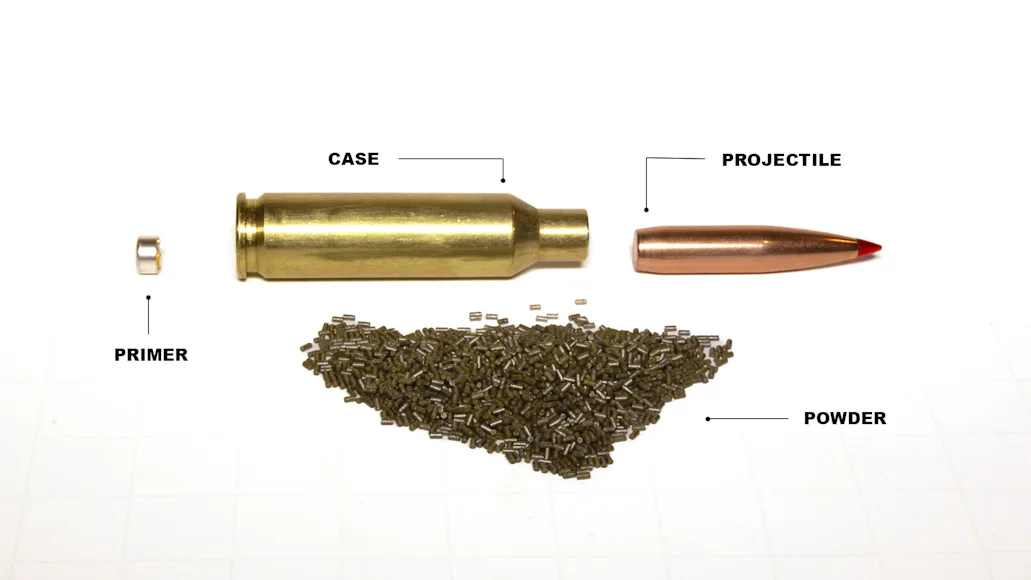Things about Ammunition Pro Llc
Table of ContentsFascination About Ammunition Pro LlcSome Of Ammunition Pro Llc3 Simple Techniques For Ammunition Pro LlcAmmunition Pro Llc for DummiesAmmunition Pro Llc Things To Know Before You Get This
The fundamental parts of ammo coincide for rifle, handgun, and shotgun ammunition. Understanding exactly how ammo functions is a vital aspect in being an accountable gun owner. Today we're checking out the what the fundamental components of ammo are and how they collaborate to terminate a round. The standard parts of ammo revealed on a 9mm. Gun Ammo round.It houses the primer and powder. The bullet is seated in the open end of the instance. When you terminate a bullet out of a semi-auto gun, the gun's extractor raises the instance from the shooting chamber and it flies out of the weapon. The situation is additionally often referred to as coverings, brass, or housings.
A gun's firing pin strikes a cartridge's guide. The guide is located in the edge of the case of a rimfire cartridge.
The Definitive Guide to Ammunition Pro Llc
Gunpowder following to the case that typically has it. It is typically a blend of saltpeter, charcoal, and sulfur.

We call the projectiles for shotshells, which we terminate via shotguns, slugs and shot. A slug is one strong item, usually made out of lead. Shot is a team of pellets constructed of lead, steel, bismuth, or tungsten alloy. Shot pellets can can be found in different dimensions and quantities. Since you have a standard understanding of the basic components of ammo, you can really feel a little bit more positive in just how your gun and ammo feature!.
The 7-Minute Rule for Ammunition Pro Llc
Stay on top of Special Deals, Development Notice of Sales, and Shop Events
Enjoyable reality: Grains are used to describe the mass of a bullet due to the fact that right back in the very early days of weapons, it was a dispenser's unit of measurement, and an usual action was required to identify just how much lead to utilize to make cast lead bullets (Firearm Ammunition). 'Grains' as a device of procedure for weight copulates back to ancient times, and represents the weight of a grain of wheat

(https://freeweblink.org/details.php?id=286227)For referral, the weight of a paper clip is around 16 gr. We understand that grains are a step of mass, and extra = much heavier, and heavy is good? Yes, hefty is good, yet mass of the projectile isn't the only thing you require to think about when picking a round for your firearm.
See This Report on Ammunition Pro Llc
This spin is created by grooves cut or hammered right into the interior of the barrel, which are referred to as 'rifling'. Fun reality, this is the origin of the term "Rifle" ex lover. A rifled musket vs. smoothbore firearm. The effect this spin has on projectiles is a stabilizing one the bullet rotating maintains the nose aimed right, in the exact same method that a perfectly spiraled football throw is mosting likely to be a lot more steady and accurate in trip than an awful duck, end over end toss.
Just how does this connect to grain weight? Imagine you get on among those playground slide carousels, the ones with bars you hang on to while it spins. Or a carnival ride where you're strapped to a board, encountering inwards, which revolves truly quick. When it's spinning slowly, you don't really feel a lot, and it's simple to hold on.
The very same effect takes place with bullets. The heavier the projectile, the more impact a faster spin will certainly have on it.
Getting The Ammunition Pro Llc To Work
But there's another element that we need to consider when picking a grain weight for our ammunition. As meant above, bullet speed, or the speed of the projectile, is a significant variable when determining the very best grain weight projectile to use. Rate is influenced by a few significant variables, including the type and quantity of propellant (gunpowder), barrel length, and bullet weight.

One of the most typical grain weight rounds for 9x19mm cartridges are 115gr and 124gr. These are usually lead core, completely jacketed (FMJ) rounds. Both of these grain weight cartridges will certainly execute well in manufacturing facility 9mm handguns, to normal pistol ranges (as much as 50 lawns). 115 grain rounds are the most common (and consequently least pricey).